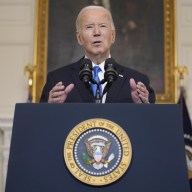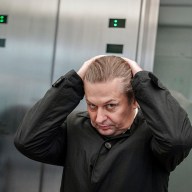BANGKOK, Thailand – Bowing partly to international demands, Myanmar’s junta decided Tuesday to postpone voting on a new and long-awaited constitution in areas hardest-hit by a devastating cyclone as the death toll soared.
For the rest of the country, however, polling stations were expected to open Saturday as planned. The decision drew swift criticism from dissidents and human rights groups who question the credibility of the vote and urged the junta to focus on disaster victims.
“They should suspend the referendum completely and devote all their national resources to the affected areas,” said Debbie Stothard, head of the Southeast Asian human rights group ALTSEAN-Burma. Myanmar is also known as Burma. “They really need to prioritize … and make sure that no more people die from exposure or from malnutrition or illness.”
Logistically and politically, it couldn’t be a worse time to ask voters to approve a draft constitution that critics say is designed to cement military rule.
Tropical cyclone Nargis struck Myanmar over the weekend, killing tens of thousands of people and leaving tens of thousands more missing, state radio reported. Most of dead were in the low-lying Irrawaddy delta region while a smaller number died around Yangon, the country’s largest city, according to the information minister.
State radio Tuesday broadcast the junta’s announcement that voting on the military-backed constitution would be delayed until May 24 in most of the townships around Yangon and in seven of the Irrawaddy delta townships.
The announcement implied that voting would proceed as planned in the rest of the country this weekend, including many areas still struggling with a lack of electricity, water and shelter caused by the cyclone that left as many as one million homeless, according to the UN World Food Program estimates.
The government has been criticized for failing to rush aid to victims, angering a public already simmering with discontent after the junta’s deadly crackdown on pro-democracy protests last September.
“People are trying to rebuild their lives, find their families and friends. Nobody is interested in going to vote,” Aung Din, director of the Washington-based advocacy group U.S. Campaign for Burma, said Monday.
Din added that the junta’s slow response to the cyclone would likely generate a stronger “No” vote.
But public opinion – and whether or not voters in cyclone-hit areas can physically reach polling stations – doesn’t appear to be the junta’s concern, according to political analysts.
“The military regime has never had any intention of holding a free and fair vote,” said Monique Skidmore, a Myanmar expert and professor at Australian National University. “They don’t care if everyone votes or not. They care about the outcome and I have no doubt they will manipulate the outcome in their favour.”
Myanmar’s generals have hailed the referendum as an important step forward in their “roadmap to democracy.”
It offers the first chance for voters to cast ballots since 1990, and the probability is high they will approve the constitution – a legal framework the country has lacked for two decades.
But critics, including the United Nations, the United States and human rights groups, question whether it will lead to democracy.
“The constitution will continue military power. There’s no question about that,” said David Steinberg, a Myanmar expert and Georgetown University professor who has been granted rare visits to meet junta officials.
The 194-page draft constitution paves the way for elections promised in 2010. It calls for a multiparty system, which the junta describes as a “discipline-flourishing democracy,” in which the military retains key powers.
Myanmar has been ruled by military governments 1962. The current junta seized power in 1988, throwing out the country’s last constitution.
A junta-appointed committee took 14 years to draft the proposed charter, refusing UN demands to seek input from the opposition.
One provision was apparently custom-made to keep detained democracy leader Aung San Suu Kyi sidelined. It bars from elected office anyone married to a foreigner or with children holding a foreign nationality.
The 62-year-old widow, who has been detained for 12 of the past 18 years, was married to a British man and has two children who are British nationals. Deemed a national security threat, she is the world’s only imprisoned Nobel Peace Prize recipient.
In the country’s last election in 1990, Suu Kyi’s National League for Democracy party won a landslide victory that the junta refused to honour. Instead, the generals stepped up arrests and repression of dissidents.
A strong military presence in future governments would be guaranteed by clauses in the draft charter that reserve several cabinet seats for military officers as well as one-quarter of the seats in both houses of parliament.
Changing the text would be tricky: Amendments would require approval by more than 75 per cent of legislators, meaning backing from some of the soldiers sitting in parliament.
Myanmar watchers say the run-up to the referendum has been marked by no debate, no polls and no effort to inform the public about the contents of the draft constitution.
Any hint of criticism has been quickly silenced.
Suu Kyi’s pro-democracy party said in a recent statement the military has stepped up harassment and arrests of its members, some of whom dared to step out in public last month wearing T-shirts that said, “No.”
















